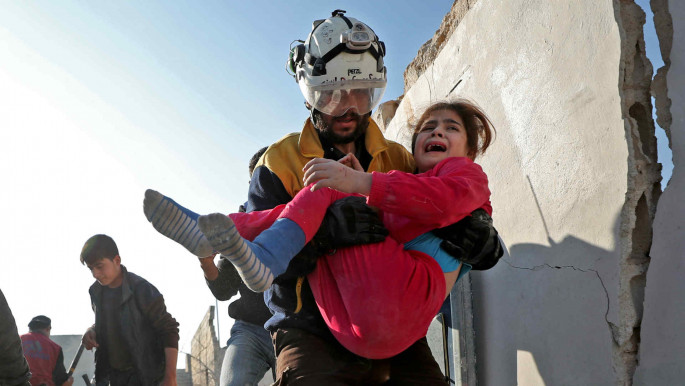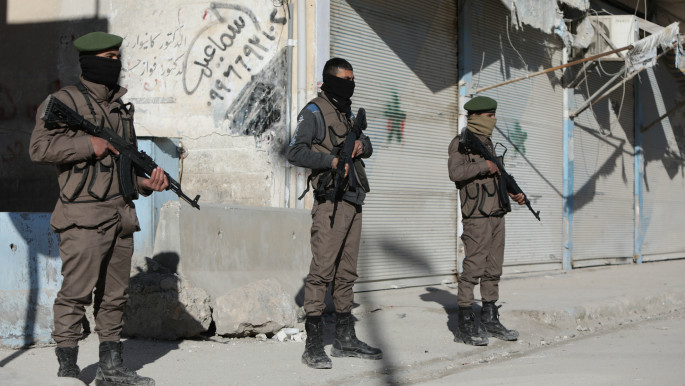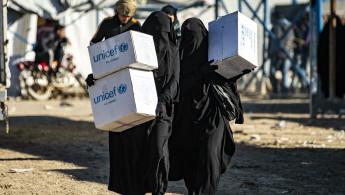'We have no alternative': Syrian Kurds predict cooperation with Assad on aid deliveries
Following a recent United Nations Security Council vote restricting aid deliveries to war-torn Syria, the region's embattled Kurds say they're backed into a corner and may turn to rival Damascus for help.
"Our humanitarian needs are used by the United Nations and other international players as a political tool against us," senior Kurdish politician Aldar Xelil told The New Arab. "This kind of decision is pushing us toward requesting support from the regime."
Faced with a veto threat from Russia, the UN Security Council voted earlier this month to adopt a resolution that reduced the number of official border crossings in Syria from four to two.
The decision leaves just two routes on the Turkish border that supply the opposition-held northwest, while eliminating entry points from Jordan and Iraq that had been used to deliver aid since 2014.
In northeast Syria, where an estimated 1.6 million people rely on humanitarian assistance, the Iraq border crossing, known as Yaroubiya, had been a key supply route for the UN and international NGOs.
Some 40 percent of all medicines supplied to the northeast passed through Yaroubiya, the UN estimates.
"The impact will be tragic," said Hasan Bashir, who works with a local charity in the town of Amuda in Al Hasakah governorate. "Without [aid deliveries], refugees won't be able to live, especially nowadays because of the economic conditions."
 |
In northeast Syria, where an estimated 1.6 million people rely on humanitarian assistance, the Iraq border crossing had been a key supply route for the UN and international NGOs |  |
The humanitarian situation in the region worsened following Turkey's recent incursion into Kurdish-held areas, which forced aid organisations to pull out and displaced some 200,000 residents.
 |
|
| Read also: Syria Weekly: 'Idlib will fall,' Assad regime tells Turkey |
Many found shelter in the major cities of Hassakeh or Qamishli, but others fled their homes for crowded, under-resourced camps.
The Kurdish-run al-Hol camp is meanwhile struggling to provide for nearly 68,000 displaced people, many of whom are the families of suspected Islamic State group [IS] fighters.
According to the Kurdish Red Crescent, more than 300 children died in the camp in 2019 due to malnutrition, hypothermia and inadequate healthcare.
Abdul Kadi Muahed, co-chair of Development and Humanitarian Affairs in the Syrian Democratic Council (SDC), says 50 percent of the health response in al-Hol camp was covered by the UN's World Health Organisation (WHO) and its partners.
"There is no alternative to that aid," said Muahed.
A majority of aid organisations operating in northeast Syria are not expected to be impacted by Yaroubiya's closure. They can still enter Kurdish-held areas from the informal crossing known as Fishkhabour on the Iraqi border.
But for UN-funded aid – including life-saving vaccinations and other medicines supplied by WHO – the only routes in are through Turkey's two border crossings in the northwest or from government-held parts of the country, which would require consent from Damascus.
WHO did not return a request for comment, but Kurdish officials who spoke with The New Arab say they fear they'll have no choice but to again turn to the regime for help.
"We have no alternative but the Syrian government," said Zozan Alosh, co-chair of Development and Humanitarian Affairs in the SDC.
"This measure will force the democratic self-administration to make concessions to Damascus," said Mehmud Bro, an official in northeast Syria's Internal Affairs Bureau. "I think it will be a pressure factor in the negotiations with the regime."
 |
This measure will force the democratic self-administration to make concessions to Damascus |  |
In an effort to stave off the Turkish incursion in October, the Kurdish-led Syrian Democratic Forces reached a deal with the government of Syrian President Bashar al-Assad that saw the return of regime troops in the Kurdish-controlled zone for the first time in years.
The pact helped repel Turkish advancement but also opened the door for Assad to chip away at Kurdish autonomy in the northeast.
 |
|
| Read also: What is next after Operation Peace Spring? |
The Syrian president, who has clung to power throughout Syria's nearly nine-year-long civil war, has said repeatedly that his ultimate goal is to restore state authority over the entire country.
With its troops deployed along the border, the Syrian government has called on the SDF to join the ranks of its military.
The SDF, the backbone of which is made up of the People's Protection Units, or YPG, has rejected any call for integration that doesn't allow it to retain its special status and military autonomy.
"The resulting picture of regime-YPG interaction is a confusing patchwork," said Dareen Khalifa, a senior analyst at the International Crisis Group. "Defined by limited security and governance cooperation, economic transactions and stumbling political talks."
Given the precarious future of Kurdish autonomy in northeast Syria, the SDC's Muahed sees any arrangement that would involve working with Damascus on aid deliveries as a PR win for Assad.
"The regime will use it in propaganda to gain the support of its opponents," he said.
Elizabeth Hagedorn is a freelance journalist focusing on migration and conflict with bylines in The Guardian, Middle East Eye and Public Radio International.
Follow her on Twitter: @ElizHagedorn



